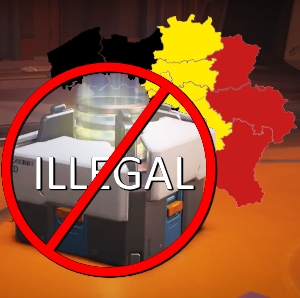You are here: Home  Sports Betting News
Sports Betting News  Gambling Industry
Gambling Industry  Belgium declares Game Loot Boxes Gambling and therefore Illegal
Belgium declares Game Loot Boxes Gambling and therefore Illegal
 Sports Betting News
Sports Betting News  Gambling Industry
Gambling Industry  Belgium declares Game Loot Boxes Gambling and therefore Illegal
Belgium declares Game Loot Boxes Gambling and therefore Illegal
 In the latest saga about randomized loot boxes in video games, another country declared loot boxes as gambling. In a statement by the Belgian Minister of Justice, Belgium declares Game Loot Boxes Gambling and are therefore Illegal. So far, this only applies to three games which are: Overwatch, FIFA 18, and Counter Strike: Global Offensive.
In the latest saga about randomized loot boxes in video games, another country declared loot boxes as gambling. In a statement by the Belgian Minister of Justice, Belgium declares Game Loot Boxes Gambling and are therefore Illegal. So far, this only applies to three games which are: Overwatch, FIFA 18, and Counter Strike: Global Offensive.
In addition, the Belgium said that if these games do not remove the loot boxes, there will be repercussions. These game makers "risk a prison sentence of up to five years and a fine of up to 800,000 Euros".
This announcement comes in the wake of the Netherlands declaring loot boxes gambling and illegal because of its addictive capacities. A few days ago, the Dutch Gaming authority said that they looked into loot boxes found in 10 games. Out of these 10 games, four were found to contravene with its Betting and Gaming Act.
According to the Belgian Gaming Commission, they are concerned over the impact loot boxes will have on young people. This is because obtaining these loot boxes are addictive and considered a form of gambling. This is due to the money involved in buying and trading them on the internet.
Geens, the Belgian Minister of Justice wants to open a dialogue with video game to remove these loot boxes. So far, no deadline has been made as to when game developers need to remove these boxes by. Other countries are still debating whether Gaming Loot Boxes are a type of gambling or not.
Meanwhile, back in the U.S., certain States have jumped on the Gaming Loot Box bandwagon. One example is the legislature in the State of Minnesota. Minnesota just introduced a bill that would that would prohibit the sale of games with loot boxes to minors.
In addition, the bill would make these warning labels on these types of games mandatory. This means a game with loot boxes would include the text:
“This game contains a gambling-like mechanism that may promote the development of a gaming disorder that increases the risk of harmful mental or physical health effects, and may expose the user to significant financial risk.”
Other legislators in California, Hawaii, Indiana and Washington are also concerned about loot boxes. For the moment, the bills in these States are stalled and the Gaming Industry is sure to fight back. At least they are more concerned about the impact of youth rather then asking whethere
On the other hand of the spectrum a few gambling agencies do not see Game Loot boxes as gambling. These include the Gambling Compliance office for New Zealand and the UK Gambling Commission.